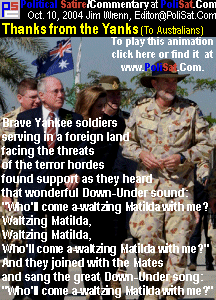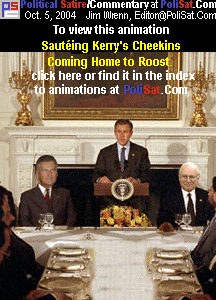|
·support our
troops, support Bush, support Cheney, support victory in Iraq, support victory in Afghanistan,
Clinton Liebrary, http://PoliSat.Com
, PoliSatDOTcom, Salute America's Heroes, Fallen Heroes Fund, oppose Gore's Global Warming theory, support milblogs, Michael Yon, Pat Dollard, BlackFive, MilBlogs, MilBlogging, Michael Yon, Mudville Gazette, HotAir.Com, JawaReport, PajamasMedia , VictoryCaucus , VetsForFreedom ,
FreedomsWatch , DayByDayCartoon , WrennCom.Com , Video , Political Satire, Politics, News, oppose MoveOn.Org, oppose Code Pink, oppose DailyKos, oppose ANSWER, support PoliSat.Com, support WrennCom.Com, ·

|

|
Archives-- Installments for
October 1 through 10, 2004, starting below in reverse chronological order.
Oct. 10,
2004 #01: Political
Satire/Commentary where satire is always commentary
but commentary isn't always satire™
(but we're confident you'll know the difference) Search
PoliSat.Com Home Tell
a friend about PoliSat.Com Subscribe
Permanent link to this
installment in PoliSat.Com's Archives Google-News
list of recent updates About
author, Jim Wrenn.
Australians
re-elect John Howard-- Aussies rebuke John Kerry and embrace George Bush-- Thanks from the Yanks
playing Waltzing Matilda-- Commentary.
To express our thanks to Australians for solidly re-electing John Howard on October 9, 2004, by
whose courageous decision Australian troops are supporting American troops in Iraq, we're displaying
the insignia of the Australian Army, Navy and Air Force linked to the Australian Navy Band's version
of Waltzing Matilda, the much-beloved unofficial Australian National
Anthem. No doubt it's a boost to the morale of our troops that Australians solidly
rejected Howard's opponent, Mark Latham, who campaigned on a platform echoing John Kerry's
"wrong war, wrong place, wrong time" theme and promising to withdraw Australian troops
from Iraq by Christmas if he were to have won. This historic vote in Australia repudiated John
Kerry's Simultaneous
Flip-Flop being peddled in Australia by Latham with vocal support from
representatives of the Kerry Campaign in Australia as a part of his international campaign for
absentee votes by Americans abroad.
To show Yankee appreciation for Aussie steadfastness, click any of the images below to play the
"unofficial" Australian National Anthem, Waltzing Matilda. Doing this will
trigger the website of the Australian
Navy Band to play Waltzing
Matilda and will say "thanks" from the "Yanks" to the Australian
military. (It may take a couple of minutes for it to load at dialup speed, but it's
worth the wait as a way to say to the Aussies, "Thanks from the Yanks" for sticking with
us.)



Perhaps
Australians' recognition of the degree of Yankee appreciation for their steadfastness will inspire
them to increase their support for us. Everyone knows the Howard administration's fear of
being ousted by what had appeared to be strong pro-Kerry, anti-Bush sentiment in Australia had
imposed a practical limitation on Howard's ability to strengthen Australia's support for Operation
Iraqi Freedom.
 Thanks
from the Yanks.
Thanks
from the Yanks.
Lyrics by Jim Wrenn, Editor at PoliSat.Com, to be sung to the
tune of Waltzing Matilda. To sing the lyrics with the tune, click here or click one of
the images above.
Brave
Yankee soldiers
serving in a foreign land
facing the threats
of the terror hordes
found support as they heard
that wonderful Down-Under sound:
"Who'll come a-waltzing Matilda with me?
Waltzing Matilda,
Waltzing Matilda,
Who'll come a-waltzing Matilda with me?"
And they joined with the Mates
and sang the great Down-Under song:
"Who'll come a-waltzing Matilda with me?"
 To view the animation illustrating Kerry's Simultaneous
Flip-Flop, click here
or click the image to the right. The entire
text of the September 28, 2004, commentary which that animation illustrates is here.
Apart from the Australian election results exhibiting a repudiation of Latham's intensely anti-war
campaign echoing John Kerry's "wrong war, wrong place, wrong time" platform, its seems
obvious that the same results strengthen Bush's "right war, right place, right time"
platform even in the international arena despite the dissatisfaction, and surely to the
consternation, of the French.
To view the animation illustrating Kerry's Simultaneous
Flip-Flop, click here
or click the image to the right. The entire
text of the September 28, 2004, commentary which that animation illustrates is here.
Apart from the Australian election results exhibiting a repudiation of Latham's intensely anti-war
campaign echoing John Kerry's "wrong war, wrong place, wrong time" platform, its seems
obvious that the same results strengthen Bush's "right war, right place, right time"
platform even in the international arena despite the dissatisfaction, and surely to the
consternation, of the French.
It will be interesting to see how the dominant media-- such as ABC
News (here),
CBS News (here)
and NBC News
(here) --
"spin" the victory in Australia. Doubtless, they will want to minimize the extent to
which it strengthens Bush against Kerry. Can other media counter-balance the dominant media's
likely effort to do so? If the current trend of self-discrediting behavior by the dominant
media continues, the answer is undoubtedly yes.
--Jim
Wrenn, Editor at PoliSat.Com
Additional
installment of Political Satire/Commentary
for Oct. 9, 2004:
Go to http://polisat.com/DailyPoliticalSatire-Commentary/Archives041001--041031/du20y04m10d09-0102.htm.
Oct. 9,
2004 #01: Political
Satire/Commentary where satire is always commentary
but commentary isn't always satire™
(but we're confident you'll know the difference) Search
PoliSat.Com Home Tell
a friend about PoliSat.Com Subscribe
Permanent link to this
installment in PoliSat.Com's Archives Google-News
list of recent updates About
author, Jim Wrenn.
Town-Hall
Debate-- In second Bush-Kerry debate, John Kerry makes Clintonesque denial: "I did not
have different positions with that war, Iraq"; George Bush smirks again.
 Reeling from the initial question posed at the Bush-Kerry Town Hall debate by a questioner asking
what she should tell her co-workers who say Kerry "waffles too much," John Kerry
paused, stood erect and thrust a firm response: "I have have not had changes in my
positions with that war." In his response to Kerry's answer, George Bush asked (with an
irksome smirk),
"Does that depend on what the meaning of 'position' 'is'
?"
Reeling from the initial question posed at the Bush-Kerry Town Hall debate by a questioner asking
what she should tell her co-workers who say Kerry "waffles too much," John Kerry
paused, stood erect and thrust a firm response: "I have have not had changes in my
positions with that war." In his response to Kerry's answer, George Bush asked (with an
irksome smirk),
"Does that depend on what the meaning of 'position' 'is'
?"
Midway though the debate, one of the questioners asked Kerry how he planned to solve the health-care
problems caused by frivolous medical-malpractice lawsuits. Kerry surprised everyone by stating
that he could support some limitations but also stressed the importance of a Patients' Bill
of Rights to sue doctors for malpractice, such as the breach of confidentiality by a cosmetic
surgeon leaking to the media the fact that a presidential candidate received injections of Botox to
achieve a less aged appearance. In a brief rebuttal to Kerry's answer to this health-care
question, Bush took pains to make facial expressions drawing attention to the wrinkles and age-lines
on his face in reasserting his position in favor of imposing caps on punitive damages and attorney's
fees.
One
of the questioners asked Kerry to explain how his plan for Iraq would differ from Bush's plan.
Kerry responded that he would "bring more allies to the table." Response to Kerry's
answer, Bush explained the inherently contradictory nature of Kerry's claim that he could persuade
more "allies" to join what Kerry now describes as "the wrong war at the wrong place
at the wrong time." Although Bush alluded to those portions of the Duelfer Report
indicating that Saddam Hussein was "gaming the system" of the "oil for food"
program to continue undermining the sanctions, diplomatic restraints prevented him from saying what
he wanted to say. However, PoliSat.Com's top-secret, parabolic brain-wave reader intercepted
Bush's thought patterns to reveal what Bush wanted to say:
We
now know from the Duelfer Report and from the revelations in the ongoing investigation of the
U.N.-run "Oil for Food" program that the "allies" that Kerry says he could
"bring to the table" have been "at the table" all along except that were there
for the limited purpose of taking bribes under the table from Saddam Hussein to defeat the very sanctions those "allies" were falsely claiming they were "supporting."
When the last questioner asked Bush to list and explain "three mistakes" he's made as
President, he declined to do so. Again, PoliSat.Com's top-secret, parabolic brain-wave reader
was able to detect the three examples Bush wanted to list. Here's our translation showing how
he wanted to answer the question:
My
first mistake was taking the word of the French given to Colin Powell and me that they would
not oppose the use of force, my second mistake was not then understanding that the Axis of
Weasels, masquerading as our "allies" on the U.N. Security Counsel, were accepting
Oil-For-Food bribes from Saddam Hussein to sabotage our efforts to enforce U.N. sanctions, and my third
mistake was assuming that Senator Kerry would not try to weasel out of his vote authorizing the use
of force.
During the post-debate spin, ABC News was trying to explain the latest discovery of Dan
Ratherism being prevalent within ABC News.
Meanwhile, Chris Matthews and NBC News' Brian
Williams were trying to determine the best way to quote Bush out of context in such a way as to
convey the opposite meaning of what he said in the same way they quoted Dick Cheney so completely
out of context on October 6, 2004, as to falsely portray a prior statement by Dick Cheney on
"Meet the Press" as though it contradicted, rather than supported, Cheney's statement
during the Cheney-Edwards debate that he had never claimed Iraq was involved in the 9-11
attack. Doubting that MSNBC and NBC will long preserve the record of these distortions,
PoliSat.Com has incorporated them into a special page aptly titled: "Chris Matthews and Brian
Williams Slander Dick Cheney" (here).
--Jim
Wrenn, Editor at PoliSat.Com.
Oct. 8,
2004 #01: Political
Satire/Commentary where satire is always commentary
but commentary isn't always satire™
(but we're confident you'll know the difference) Search
PoliSat.Com Home Tell
a friend about PoliSat.Com Subscribe
Permanent link to this
installment in PoliSat.Com's Archives Google-News
list of recent updates About
author, Jim Wrenn.
Bush-Kerry
debate-- Old Kerry Wine in New Kerry Bottle-- There he goes again-- Will John Kerry repeat in Town
Hall Debate the enemy propaganda he endorsed in the first debate with George W. Bush?
 In the first debate, John Kerry sought tactical political advantage by making a claim against George
W. Bush calculated to reinforce the defamation spread by enemy propaganda-- i.e., the false,
defamatory claim that Bush's "real" purpose in launching Operation Iraqi Freedom was for
the United States to "seize" Iraq's oil. How did Kerry do this? He made the
statement that when Baghdad fell, "the only building" our forces "protected" was
the "oil" ministry.
In the first debate, John Kerry sought tactical political advantage by making a claim against George
W. Bush calculated to reinforce the defamation spread by enemy propaganda-- i.e., the false,
defamatory claim that Bush's "real" purpose in launching Operation Iraqi Freedom was for
the United States to "seize" Iraq's oil. How did Kerry do this? He made the
statement that when Baghdad fell, "the only building" our forces "protected" was
the "oil" ministry.
Kerry knows, as does anyone who was paying attention at the time, that Baghdad "fell" far
sooner than we had expected. Kerry knows that the eleventh-hour refusal of Turkey keep its
word to allow the 4th Infantry Division to enter Baghdad from the north had given our forces every
reason to expect far greater difficulty in "taking" Baghdad and the area we now call the
Sunni Triangle. He knows we weren't prepared for Saddam's forces, agents, etc. to suddenly
abandon Baghdad-- Kerry, like the rest of us, surely remembers that on one day, Baghdad Bob was
holding press conferences in Baghdad denying that any American troops had entered any part of the
city, and the very next day he, and all the Hussein-regime officials, representatives,
"minders" for the media, military personnel, police, suddenly disappeared.
Kerry knows that the primary reason for which our forces were risking their lives to guard the oil
wells, the oil refineries, the oil terminal on the Gulf, and the "oil ministry
building" was that we expected Saddam Hussein to try to reprise his mass-destruction of the oil
industry as he had done in Kuwait in 1991. Kerry knows that the reason we asked our troops to
risk their lives to protect those facilities and that industry was not for us to "seize"
it but rather to preserve its viability as a means for Iraq to recover. Yet, just as in
1971, Kerry was willing to seek tactical political advantage by making a statement to the world
that simultaneously defamed the motives of our leaders and provided support to enemy
propaganda spreading the same defamation.
What's the difference between his being willing in 1971 to give testimony in the Senate as a
"highly decorated" American soldier accusing his fellow soldiers still serving in Vietnam
as engaging in widespread, barbaric "war crimes" as a matter of "policy"
throughout the chain of command from top-to-bottom and his being willing in 2004 in the first
Bush-Kerry debate to make an assertion supporting the enemy's propagandistic defamation that Bush
launched Operation Iraqi Freedom to "control" Iraq's oil. None! It's simply
the old Kerry wine in a new Kerry bottle.
--Jim
Wrenn, Editor at PoliSat.Com.
Oct. 7,
2004 #01: Political
Satire/Commentary where satire is always commentary
but commentary isn't always satire™
(but we're confident you'll know the difference) Search
PoliSat.Com Home Tell
a friend about PoliSat.Com Subscribe
Permanent link to this
installment in PoliSat.Com's Archives Google-News
list of recent updates About
author, Jim Wrenn.
John Kerry
Rewinds, Rewrites and Replays History by Distorting the Charles Duelfer Report; Oil for Food:
Political Nutrition for Saddam Hussein, France, U.N., et al; Inspections, WMD's, and Sanctions.
 John Kerry is using a distortion of the Charles Duelfer Report to rewind, rewrite and replay history
skewed by selective-hindsight revisionism to support a naive assertion that we would be better off
if George Bush had declined to launch Operation Iraqi Freedom. To test the sensibility of Kerry's
claims now, let's re-wind history and operate on the basis of what the Dulfer Report now says we now
know and on the basis of Kerry's claim that relying on indigenous Afghan forces rather than
commitment of large American military forces "allowed" Usama bin Laden to
"escape" in Tora Bora in December, 2001. Would we today really have Saddam
Hussein "boxed in" so he couldn't harm us or covertly help our enemies harm us? To
test "Scenario No. 1," go
here; To test "Scenario No. 2,"
go here; To test "Scenario
No. 3," go here.
John Kerry is using a distortion of the Charles Duelfer Report to rewind, rewrite and replay history
skewed by selective-hindsight revisionism to support a naive assertion that we would be better off
if George Bush had declined to launch Operation Iraqi Freedom. To test the sensibility of Kerry's
claims now, let's re-wind history and operate on the basis of what the Dulfer Report now says we now
know and on the basis of Kerry's claim that relying on indigenous Afghan forces rather than
commitment of large American military forces "allowed" Usama bin Laden to
"escape" in Tora Bora in December, 2001. Would we today really have Saddam
Hussein "boxed in" so he couldn't harm us or covertly help our enemies harm us? To
test "Scenario No. 1," go
here; To test "Scenario No. 2,"
go here; To test "Scenario
No. 3," go here.
1.
Hindsight "Replay" of Kerry Scenario No. 1:
This
thought experiment rewinds history, re-writes it with "full hindsight" by assuming that on
September 12, 2001, we knew everything about Iraq that we now "know"
according to the Charles Duelfer Report. Then it replays history according to what John Kerry now
says (with the benefit of hindsight) he would have then known to be the proper course of
action beginning on September 12, 2001.
A.
Assumed Retroactive "Knowledge" on September 12, 2001:
(01)
We'd have known reports from Czech Intelligence that Mohammed Atta met with Iraqi Intelligence
before 9-11 could never establish a link between Iraq and 9-11.
(02)
We'd have known Saddam Hussein had no stockpiles of chemical or biological weapons.
(03)
We'd have known Saddam Hussein had preserved samples of chemicals and biological agents with which
he could restart his chemical/biological weapons.
(04)
We'd have known Saddam Hussein had no active nuclear weapons program.
(05)
We'd have known Saddam Hussein had preserved the intellectual capital and design-work for restarting
his nuclear weapons program.
(06)
We'd have known Saddam Hussein had not acquired enriched uranium.
(07)
We'd have known that Saddam Hussein wanted to acquire enriched uranium as soon as feasible without
such acquisition being detected or prevented.
(08)
We'd have known that "world opinion" would continue blaming U.S. sanctions for the
"thousands" of "Iraqi babies" dying each year.
(09)
We'd have known that our "allies" in the U.N. wanted sanctions to be ended.
(10)
We'd have known that the world considered our maintaining the no-fly zones in the northern and
southern portions of Iraq to be an unjustified infringement on Iraq's sovereign dignity.
(11)
We'd have known that our "allies" in the U.N, would want us to cease maintaining the
no-fly zones.
(12)
As we planned how to dislodge the Taliban and al Qaeda from Afghanistan, we'd have known that the
Muslim world and French "intellectuals" believed the CIA and the Mossad, rather than Usama
bin Laden, perpetrated the 9-11 attack and that thus, the Muslim world and French
"intellectuals" would consider our threats to topple the Taliban (unless they were to
deliver Usama bin Laden, his subordinates and his fighters into U.S. custody) to be an example of an
imperialistic, Christian "crusade" against the "Muslim world."
(13)
We'd have known that hundreds of thousands of Russian troops were ultimately unable to maintain
control over Afghanistan.
(14)
We'd have known that some Afghan warlords could be trusted to help us defeat the Taliban and
al Qaeda in Afghanistan, but we'd have also known that some (many?) could not be so trusted,
and we wouldn't have been abe to be certain which ones would be which.
B.
Replay of History according to Kerry's Scenario No. 1:
(01)
Kerry would have "known" Saddam Hussein had no WMD's, and on such basis, Kerry would have
assumed that Hussein alone, or in collaboration with the enemy of his enemy (i.e., in collaboration
with al Qaeda), could not inflict massive casualties on our residual forces in the Persian
Gulf.
(02)
Kerry would have "known" that reliance upon Afghan "warlords" to oust the
Taliban would pose a serious risk that some of them would pretend to help us while actively seeking
to help the Taliban, al Qaeda or both.
(03)
Kerry, wanting to minimize the risks of being judged harshly in hindsight, would have ordered the
military to plan operations in Afghanistan to minimize possibility of 1-B(02) (above) even though
the means to do so would: (a) require massive numbers of U.S. "boots on the
ground" in Afghanistan, (b) require a much-longer logistical preparation time, which would
thereby give the Taliban and al Qaeda more than enough time to prepare to resist and/or escape, (c)
dramatically increase the probably U.S. casualties, (d) make it dramatically harder for Pakistan's
President Pervez Musharraf to politically cooperate with, rather than to actively oppose, what would
appear to be a massive U.S. invasion of Afghanistan rather than relatively limited assistance to
indigenous forces opposing the Taliban and al Qaeda.
(04)
Kerry would somehow persuade Musharraf to cooperate with a massive invasion of Afghanistan by a U.S.
military force large enough to avoid the risks of needing to rely upon indigenous war-lords to
topple the Taliban and/or capture bin Laden-- i.e., a force comparable in size to the one we
amassed in the 1991 Persian Gulf War for the relatively easier task of evicting Saddam Hussein from
Kuwait. (Keep in mind that the size of our military in 2001 was approximately half the size of
our military at the time of the Persian Gulf War in 1991.)
(05)
By late December, 2001, at the earliest, or late Spring, 2002, at the latest, the massive invasion
of Afghanistan ordered by Kerry would commence. (Here, I'm giving Kerry the benefit of the
doubt in even assuming that one who voted against the 1991 Persian Gulf War, which the U.N. formally
supported, would have invaded Afghanistan at all-- frankly, I seriously doubt it.) By this
time, Usama bin Laden would have moved from Afghanistan into the no-man's-land portion of Pakistan
knowing that Pakistan would not allow any massive invasion of those areas by U.S. military
forces. In departing Afghanistan, bin Laden and his supporters would have had ample time to
avoid leaving information, video-tapes, etc. behind-- Consequently, that video-tape in
which bin Laden bragged about masterminding 9-11 would not have been discovered and would not have
been played for the world as it was in reality in October, 2001, when we discovered it.
[Don't forget that even long after worldwide broadcast of this tape, large portions of the Muslim
world and French "intellectuals" viewed it as something "made up" by the CIA and
still adhered to the view that the CIA and/or the Mossad, rather than bin Laden, had
masterminded 9-11 to give the U.S. an "excuse" to invade Afghanistan-- For example, see
the February 26, 2002, installment
at PoliSat.Com (here)].
(06)
Our massive invasion of Afghanistan would lead most war-lords to distrust us and oppose us (just as
they opposed the Russians) rather than joining forces with us. We would become "bogged
down" in dangerous mountainous warfare with the same war-lord armies that inflicted massive
casualties on the Russians. We would not "capture" bin Laden.
(07)
Continuing worldwide propaganda by fanatical Muslims would continue inflaming the Muslim world
against the U.S. for trying to "conquer" a Muslim country as retaliation for the 9-11
attack, which Muslims and French "intellectuals" would still claim to have been
perpetrated by the CIA and/or the Mossad and/or "heroic" Saudis as "revenge" for
Saudi Arabia being "desecrated" by the presence of U.S. bases and residual military forces
following the Persian Gulf War. Additional world-wide propaganda would persuade Muslims that
the real purpose of the massive military invasion of Afghanistan by the U.S. would be to control a
trans-Afghanistan "oil pipeline."
(08)
Pressure on Musharraf to cease "collaborating" with the U.S. "invasion" of a
Muslim country would continue intensifying.
(09)
Saddam Hussein, seeing our flanks and rear dangerously exposed would recognize the tactical and
strategic advantages for him to covertly collaborate with our enemies while intensifying demands
that the U.N. terminate the sanctions against him.
(10)
With so many forces committed to Afghanistan and world opinion against us intensifying, Kerry would
display his promised spirit of cooperation with our "allies" (France, Germany, Russia, et
al) by agreeing to their demands to end U.N. sanctions against Iraq and end the no-fly
zones. After all, under this set of assumptions, the world would have already
"known" that Saddam Hussein no longer possessed stockpiles of chemical or biological
weapons and did not have an active nuclear-weapons program.
(11)
Immediately upon the termination of sanctions (sometime in early 2002), Saddam Hussein would have
re-started his programs for chemical, biological and nuclear weapons. Iraq's Lybia would have
been eager to share with Saddam Hussein the WMD programs that we now know Lybia then possessed.
(12)
Within a relatively short period of time, Saddam Hussein would have been able to produce chemical
and biological agents to be covertly delivered to the enemy of his enemy (i.e., al Qaeda) to
be used in Afghanistan against our troops and to be used in the United States. Saddam's having
long been able to use terror to suppress Islamic fanatics in Iraq would have prevented him from
worrying that helping al Qaeda attack U.S. interests would ultimately jeopardize his internal power
base.
C.
Conclusion.
It
seems readily apparent that the outcome "I-B(12)" would be far more dangerous than what we
now face in Iraq and Afghanistan. To think otherwise would be to engage in highly selective,
and highly unrealistic retroactive application of what we now know in "hindsight."
One of the ways we avoided the mistakes of the Russians in Afghanistan was that our willingness to
deployed limited forces to collaborate with the warlords (and thereby risk being betrayed by some of
them as may have occurred in Tora Bora) was a major factor in convincing the warlords that we
wanted Afghans, not us, to control Afghanistan and in enabling Musharraf to take the extreme
political risks of cooperating with the U.S. in ousting the Taliban and crippling al Qaeda.
Thus, it's Bush's strategy that's rooted in the real world and Kerry's that would have been rooted
in Fantasyland. It would be living in Fantasyland to believe Saddam Hussein would not by now
be actively collaborating with al Qaeda against the United States, Kuwait and Saudi Arabia.
Saddam Hussein's long successful history of using terror to suppress Islamic fanatics in Iraq would
have given him the confidence that his collaboration with al Qaeda would not jeopardize his own
power base.
II.
Hindsight "Replay" of Kerry Scenario No. 2:
This
thought experiment shows that if a President Kerry were to have handled Afghanistan in a way to
avoid needing to rely upon indigenous war lords to "capture" bin Laden, it's highly
unlikely he would have been able to deploy to the Persian Gulf a force large enough to: (a)
convince our U.N. "allies" that he would invade Iraq unless they were to adopt a
resolution demanding that Saddam Hussein readmit, and cooperate with, U.N. inspectors (b) intimidate
Saddam Hussein into re-admitting the U.N. inspectors and "cooperating" with them.
Thus, under this scenario, Kerry would have been unable to take the steps necessary to enable us to
learn what we now "know"-- i.e., that Saddam Hussein no longer had WMD stockpiles
or active WMD programs. Under this scenario, the corrupt non-enforcement of the
sanctions, the continued diversions of funds from the "oil for food" program to Saddam
Hussein, and increasing world-wide pressure to lift the sanctions to stop causing the deaths of
thousands of "Iraqi babies" would have continued until Kerry would have placated our
"allies" in the U.N. by relaxing the sanctions. The likely result is that the
situation we'd be facing today would be comparable to 1-B(12) under Scenario No. 1 above.
III.
Hindsight "Replay" of Kerry Scenario No. 3:
This
thought experiment rewinds history, re-writes it with "selective hindsight" by assuming
that we would not have learned what we now "know" unless and until we were to have
allowed inspections to continue until such time as Hans Blix would report that he had found Iraq to
be free of WMD stockpiles and programs. It also assumes (unlike Scenario No. 2) that a
President Kerry would have handled Afghanistan in the same way as did Bush (rather than in the way
Kerry now claims he would have handled it) so that a President Kerry would then have been able to
amass 250,000-troops force on Saddam Hussein's border in order to: (a) convince our
"allies" that he would invade Iraq unless they were to adopt resolutions authorizing force
if Saddam Hussein were to refuse to readmit, and then cooperate with, U.N. inspectors and (b)
intimidate Saddam into readmitting the inspectors and "cooperating" with them.
A.
The "Inspections" Phase:
(01)
By mid-2002, Inspector Blix would have reported to the U.N. that Iraq was "free" of WMD
stockpiles and programs.
(02)
Our "allies" would have treated such report as requiring: (a) repeal of the
sanctions, (b) withdrawal of our massive force from the Persian Gulf, and (c) cessation of the
non-fly zones.
(03)
Even if Kerry were to have vetoed any resolution to end sanctions, our "allies" would have
begun overtly (rather than merely covertly) ignoring them, in which case they would have become even
less meaningful than previously, so it's really irrelevant whether he would have vetoed any such
resolution or ultimately abstained to allow its passage.
(04)
Even if Kerry were to have vetoed any resolution calling for cessation of the no-fly zone, and even
if he were to have continued the no-fly zones over vigorous international criticism as being
"unfair" to Hussein whom the inspections would have "proven" to have complied
with the WMD resolutions, his doing so would have continued further inflaming the Muslim world
against us and inspiring sympathizers to join al Qaeda all over the world to resist what they would
characterize as our "illegal" military operations over the air space of a sovereign
Arab/Muslim country.
(05)
Nevertheless, most Arabs in the Middle East (including most Arab governments) would believe that
Saddam Hussein had merely successfully hidden his WMD's rather than seriously believing a
pronouncement by Blix that Hussein no longer possessed them, so his power to intimidate his
neighbors would have thus been increased by the de-facto (if not de jure) dissolution
of sanctions.
(06)
Our "allies" in the U.N. and the entire Muslim world would demand that we immediately
withdraw from the Persian Gulf the military forces we had positioned there to coerce Saddam into
"complying" with U.N. resolutions. There is no way Kerry would have resisted such
pressure, so he would have withdrawn all but token forces comparable to those that were in the
Persian Gulf region on Sept. 10, 2001 (whose presence, by the way, was part of the motivation for
9-11).
(07)
We would have the illusion of having Saddam "in a box," but the de-facto (if not de
jure) dissolution of the sanctions would have freed Saddam to resume his production of chemical
and biological weapons and re-start his nuclear-weapons program.
(08)
Libya's Kaddafi would not have surrendered his WMD programs to the U.S. and Britain-- instead, he
would have offered assistance to Saddam Hussein and/or al Qaeda.
(09)
By now, Saddam Hussein would have easily re-created his chemical/biological stockpiles as well as
re-starting his nuclear-weapons program.
(10)
By now, Saddam Hussein would be perceived among Arabs and non-Arab Muslims as the undisputed leader
of the Middle East.
(11)
By now, Saddam Hussein, sociopathic megalomaniac that he is, would have perceived it to be in his
interest to covertly collaborate with the enemy of his enemy-- i.e., with al Qaeda
against the United States. His having successfully used unspeakable terror to suppress the
Kurds and Shiites for decades would have caused him to believe that his helping al Qaeda attack the
U.S. would not pose a serious threat to his power base in Iraq, so he would have done it.
Remember, he had no compunction against ordering an attempted assassination of former President
Bush.
(12)
By now, a President Kerry would have no way to effectively or reliably determine whatever might be
precisely the last moment in time at which we could preemptively strike Iraq to prevent catastrophic
collaboration with al Qaeda.
B.
Conclusion:
It
seems readily apparent that the outcome "III-B(12)" would be far more dangerous than what
we now face in Iraq and Afghanistan. To think otherwise would be to engage in highly
selective, and highly unrealistic retroactive application of what we now know in
"hindsight."
Overall
Conclusion:
To
"rewind, rewrite" and then "replay" history in accordance with what Kerry now
claims he would have done if he were to have been president amply demonstrates that our situation
would be far more dangerous than it is today.
--Jim
Wrenn, Editor at PoliSat.Com
Oct. 6,
2004 #01: Political
Satire/Commentary where satire is always commentary
but commentary isn't always satire™
(but we're confident you'll know the difference) Search
PoliSat.Com Home Tell
a friend about PoliSat.Com Subscribe
Permanent link to this
installment in PoliSat.Com's Archives Google-News
list of recent updates About
author, Jim Wrenn.
Commentary:
Cheney-Edwards debate-- John Edwards thanks wife for reminding him of pre-debate meetings with Dick
Cheney and then calls Cheney's memory lapse a "failure to be straight."
Post-debate spin is in high gear after last night's Cheney-Edwards debate. As was the case
with the first Bush-Kerry debate, the effects are not likely to become discernible until much later.
Thanks
for the Memories.
Shortly after the debate, John Edwards publicly credited his wife with reminding him after
the debate that he'd met Dick Cheney several times before the debate. (I witnessed this
myself.) As part of the predicate for criticizing Edwards for his long periods of absence from
the Senate, Cheney said that despite his regularly presiding over the Senate every Tuesday, he had
never "met" Edwards until the debate and then added that Edwards had exhibited such a long
pattern of being absent from the Senate that his hometown newspaper began calling him "Senator
Gone." During the debate, Edwards did not dispute Cheney's assertion either
because he sensibly interpreted it as having been impliedly limited to the context of business in
the Senate or, if he interpreted it more broadly, because he had simply forgotten that he and
Cheney had met several times in the past.
 After Edwards' wife "reminded" him after the debate that he had "met"
Cheney several times before the debate, he then characterized Cheney's assertion as an
example of "not being straight with the American people." If one were
assume the reason Edwards failed to dispute Cheney's assertion during the debate was that
he had sensibly interpreted it as an assertion that Cheney had not met Edwards in the Senate,
then Edwards' post-debate comments were disingenuous. However, even if one were to
assume the reason Edwards failed to dispute Cheney's assertion during the debate was that he had
forgotten that he'd met Cheney several times before the debate, then his post-debate comments
were nevertheless disingenuous for characterizing Cheney's assertion as an example of "not being straight with the American people"
rather than a memory lapse like the one just experienced by Edwards.
After Edwards' wife "reminded" him after the debate that he had "met"
Cheney several times before the debate, he then characterized Cheney's assertion as an
example of "not being straight with the American people." If one were
assume the reason Edwards failed to dispute Cheney's assertion during the debate was that
he had sensibly interpreted it as an assertion that Cheney had not met Edwards in the Senate,
then Edwards' post-debate comments were disingenuous. However, even if one were to
assume the reason Edwards failed to dispute Cheney's assertion during the debate was that he had
forgotten that he'd met Cheney several times before the debate, then his post-debate comments
were nevertheless disingenuous for characterizing Cheney's assertion as an example of "not being straight with the American people"
rather than a memory lapse like the one just experienced by Edwards.
Conventional
Wisdom versus Conventional Wishdom.
Regarding the substance and tone of the debate, the consensus among most political experts is that debates between vice-presidential candidates do
not significantly affect the votes for president. However, the debate last night is destined
to become the exception that proves the rule. Why? Because a question
posed by Cheney sharply focused attention on a vulnerability of both Kerry and Edwards rivaling, if
not equaling, the vulnerability inherent in their self-contradictory claims that they could
"bring more allies to the table" as a means for reducing our "disproportionate"
share of the casualties despite their having characterized Operation Iraqi Freedom as "the
wrong war at the wrong time in the wrong place," as a "colossal mistake," and as a
"grand diversion."
Political
Expediency to Counter the "Dean Machine"-- i.e., the "Dean of Mean" and
"Doctor of Spleen."
What's the basis for this assertion? The most profound, most relevant, and most likely to
endure "sound-bite" was a question posed by Dick Cheney, the gist of which
was:
Since John Kerry said-- before voting against the $87 billion supplemental authorization to support
the troops in Iraq and provide funds to rebuild infrastructure-- that it would be
"irresponsible" for a Senator to vote against it, and since at the time of the vote two
weeks later, Howard Dean seemed clearly on the verge of achieving a potentially insurmountable lead
in the primary race for the Democratic nomination by running on an overtly and unequivocally
anti-war platform, Kerry (and Edwards) found it politically expedient to vote against the
authorization, the American people should ask themselves this question: Since Kerry and
Edwards were unable or unwilling to stand-up against political pressure from Howard Dean, how could
they be expected to stand up against al Qaeda in waging the war against terror regardless of
political pressures that will arise from anti-war sentiments, the "international
community," and/or tactical setbacks in our struggle against Islamic
fanaticism?
This
was the first show-stopper but not the last one.
Political
Callousness-- Kerry/Edwards "body count" formula.
The second show-stopper was in the form of a profound, yet heretofore unexpressed, observation about
the political callousness of Kerry's and Edwards' repeated assertions that "we" are
sustaining "90%" of the casualties as though the much larger number of Iraqi soldiers,
policemen and officials killed or murdered by the enemy "don't count." This
observation by Cheney exposed a political callousness as offensive as their callousness in providing
propaganda to the enemy killing our soldiers by mocking Prime Minister Alawi as a "puppet"
of the United States almost immediately after Alwai had received a standing ovation in Congress for
a moving speech in which he expressed profound appreciation for the sacrifices our troops have made,
and are making, in Iraq. Ostensibly, Kerry and Edwards would count the bodies of French
"fighters" in Iraq (if there were to be any) but not the bodies of Iraqis
fighting for their own freedom in determining whether American losses would be
"disproportionate" to whatever may be Kerry's "global test" for what's right or
wrong. Isn't it better to have ten divisions of Iraqis fighting on our side than ten divisions
of the French?
 Starkly
Differing Visions; Tactics versus Strategy.
Starkly
Differing Visions; Tactics versus Strategy.
Rarely has an election presented the electorate with two such starkly differing
visions for the future: Tactics versus strategy; the tic-tac-toe
tactics that Kerry and Edwards seem to favor versus or the chessboard "strategery"
Bush has been implementing. Has Bush and/or his subordinates made mistakes in the course of
Operation Iraqi Freedom? Of course. Did Eisenhower/Churchill/Roosevelt and/or their
subordinates make mistakes in the course of planning and implementing Operation Overlord? Of
course. Did Truman and/or his subordinates make mistakes in handling the post-war occupation
of Germany and Japan in preparing them for democracy? Of course he did . Did any such
tactical mistakes negate the moral justification for their visions and strategies designed to
increase the scope of liberty against the darkness of tyranny? Of course not.
The issue is not how best to "respond" to terrorism, it's how to eradicate Islamic
fanaticism that seeks a return to the Dark Ages. That's why "strategery" chess beats
the tic-tac-toe mess that the Kerry/Edwards "internationalist" tactics would yield.
The tactic of "responding" rather than preempting exemplifies the pre-9-11 mentality that
we all shared-- including yours truly, who always thought Bush 41 was right in refusing to "go
all the way to Baghdad" notwithstanding post-Persian-Gulf-War criticisms of his failure to do
so, most of which criticisms emanated from those who had opposed the Persian Gulf War. How
short are most people's memories regarding these things.

 No
Sex, Please-- We're Americans.
No
Sex, Please-- We're Americans.
Edwards also seized the opportunity of this debate to exhibit faux admiration for Dick Cheney's
support for Bush's position on "marriage" while also supporting his lesbian
daughter. Rather than engaging Edwards' faux "compliments," Cheney declined to say
more than he said in his initial response to the question asking him to explain how he reconciles
his support of his daughter with his support of Bush, who favors a constitutional amendment to make
it black-letter law (rather than merely judicial precedent) that the Full Faith and Credit Clause
not be used to force one state to recognize marital policies of another state that my violate its
public policy regarding marriage.
 There may be, and probably are, compelling reasons for which government ought to recognize
"civil unions" in which people help society at large by making long-term commitments to
each other. There are equally compelling reasons for according presumptions favoring
heterosexual marriage over civil unions in particular contexts-- such as adoption, for example.
There may be, and probably are, compelling reasons for which government ought to recognize
"civil unions" in which people help society at large by making long-term commitments to
each other. There are equally compelling reasons for according presumptions favoring
heterosexual marriage over civil unions in particular contexts-- such as adoption, for example.
--Jim
Wrenn, Editor at PoliSat.Com.
Oct. 5,
2004 #01: Political
Satire/Commentary where satire is always commentary
but commentary isn't always satire™
(but we're confident you'll know the difference) Search
PoliSat.Com Home Tell
a friend about PoliSat.Com Subscribe
Permanent link to this
installment in PoliSat.Com's Archives Google-News
list of recent updates About
author, Jim Wrenn.
Cheney-Edwards
debate-- Dick Cheney ready to sauté John Kerry's "Cheekins" coming home to roost from
Poland's President Kwasniewski castigating Kerry for disrespecting Poland in Bush-Kerry debate.
 The smug, cheeky nature of many of John Kerry's intellectually self-contradicting, disingenuous
"policy" statements about Iraq are beginning to boomerang against Kerry from foreign
sources rather than merely domestic opponents of Kerry. To properly define the boomerang
effects of such cheeky statements requires this writer to coin a new word for use in an old saying
to aptly describe this phenomenon: Such statements have become John Kerry's
"cheekins" coming home to roost-- i.e., this writer hereby coins
"cheekins" to be cheeky pronouncements made with short-sighted, self-serving tactical
purposes but which produce strategically counter-productive effects not expected by the
pronouncer.
The smug, cheeky nature of many of John Kerry's intellectually self-contradicting, disingenuous
"policy" statements about Iraq are beginning to boomerang against Kerry from foreign
sources rather than merely domestic opponents of Kerry. To properly define the boomerang
effects of such cheeky statements requires this writer to coin a new word for use in an old saying
to aptly describe this phenomenon: Such statements have become John Kerry's
"cheekins" coming home to roost-- i.e., this writer hereby coins
"cheekins" to be cheeky pronouncements made with short-sighted, self-serving tactical
purposes but which produce strategically counter-productive effects not expected by the
pronouncer.
An example of one of Kerry's "cheekins coming home to roost" is described in the Drudge
Report for October 5,2005:
Polish President Aleksander Kwasniewski has slammed Dem president hopeful John Kerry for not recognizing Poland's contributions and sacrifice to the war in Iraq.
"It is sad that a senator with 20 years of experience does not recognize Polish contribution. This is immoral," Kwasniewski told FACTS in an interview commenting on the US Presidential Debate.
"It is sad that a senator with 20 years of experience underestimates Polish sacrifice, this is sad."
The Polish President added however that one should consider this was a part of the ongoing electoral campaign.
"I do not think this was out of ignorance," the president emphasized on the TVN Facts.
"There is one thing which should be stated clearly: this coalition is not just the United States, Great Britain, Australia alone; it also involves participation of Polish, Ukrainian, Bulgarian and Spanish soldiers who have died. It is immoral not to recognize the involvement we contributed based on our conviction that there should be unity in fighting terrorism, that there was a need to display international solidarity and that Saddam Hussein was a dangerous individual of this world."
"President Bush acted like a real Texan gentleman, he made sure to show appreciation for other countries' involvement in the coalition," Kwasniewski pointed out.
Source:
[http://www.drudgereportarchives.com/data/2004/10/05/20041005_151002_dnc58.htm]
The statement by Polish President Aleksander Kwasniewski
underscores the fatuous, self-contradictory nature of Kerry's repeated assertions that he will
"bring more allies to the table." Instead, Cheney and Bush will bring more allies
"to the table" with their special recipe sautéing Kerry's Cheekins that have come home to
roost. Kerry's defeat on November 2, 2004, will strengthen the resolve of our most steadfast
allies rather than weakening their resolve as would be the effect of Kerry being elected.
By surreptitiously intercepting electronic communications within the Bush campaign detailing how
Cheney will use this information tonight in the Cheney-Edwards debate and how the Bush campaign will
use in in forthcoming campaign commercials, PoliSat.Com intercepted an electronic copy of the video
and transcript of the next commercial.
Sautéing
Kerry's Cheekins Coming Home to Roost.
 We're
Cheney and Dubya to boost
We're
Cheney and Dubya to boost
the strength of our allies with foods
sautéed and then curried
when, thanks to John Kerry,
his cheekinsº¹ come home for to
roost.
Before
we begin to partake,
to Poland, a "thank-you" we state
for promptly returning
these cheekins that Kerry
sent Poland belittling its weight.
In the interest of fairness, PoliSat.Com's Washington Bureau Drawer Chief showed this commercial to
high Kerry campaign officials. Despite being unsure what they were high on, he wanted to give
them a chance to comment about the commercial. A top Kerry advisor, speaking on condition of
anonymity, admitted that "Experts on political nutrition had warned Kerry of the nutritional
paradox that the cheekins diet would cause him to lose, rather than gain, gravitas even though
simultaneous consumption of such cheekins would increase the gravitas of his opponents."
º¹·"Cheekins"
is a word I coined to define smug, cheeky, self-contradictory statements by Kerry belittling
contributions by our allies in Iraq while simultaneously claiming he could "bring more allies
to the table" to help us.
--Jim
Wrenn, Editor at PoliSat.Com.
Oct.
4, 2004-- No update today.
Oct. 3,
2004 #01: Political
Satire/Commentary where satire is always commentary
but commentary isn't always satire™
(but we're confident you'll know the difference) Search
PoliSat.Com Home Tell
a friend about PoliSat.Com Subscribe
Permanent link to this
installment in PoliSat.Com's Archives Google-News
list of recent updates About
author, Jim Wrenn.
Polls
after first Bush-Kerry Debate show preferences for John Kerry as Debate-Team Captain and George W.
Bush as Commander-in-Chief with vision through National Security Threat Scope.
 Predictably, all the dominant media concluded that John Kerry "won" the first Bush-Kerry
debate. Surprisingly, a significant number of pro-Bush pundits seem to agree. Both
groups are wrong, but for different reasons. "Winning" the debate means gaining
or losing support among likely voters for Commander-in-Chief rather than for Captain of the
Debate Team. Quick polls among "registered" voters (in contrast to polls including
the more time-consuming and more realistic process of identifying "likely" voters) tend to
overemphasize the opinions of the least informed, least motivated voters.
Predictably, all the dominant media concluded that John Kerry "won" the first Bush-Kerry
debate. Surprisingly, a significant number of pro-Bush pundits seem to agree. Both
groups are wrong, but for different reasons. "Winning" the debate means gaining
or losing support among likely voters for Commander-in-Chief rather than for Captain of the
Debate Team. Quick polls among "registered" voters (in contrast to polls including
the more time-consuming and more realistic process of identifying "likely" voters) tend to
overemphasize the opinions of the least informed, least motivated voters.
The quick polls of "registered" voters are showing not that support has shifted from Bush
to Kerry for the job of Commander-in-Chief but rather that watching the debate made more people
think Kerry would be best as Debate Team Captain. Unfortunately for Kerry and fortunately for
the country (and for Bush), we'll be voting on November 2 to decide which of them should be
Commander-in-Chief.
Another reason the dominant media (and even some pro-Bush pundits) have drawn the wrong conclusions
about the short-term polling after the debate is that they fail to understand what it is about Bush
that makes him persuasive to likely voters (i.e., the most informed,
most-highly-motivated among the "registered" voters): common sense, sincerity,
conviction and his lack of glibness, slickness and "sophistication." People
wrongly think it was Al Gore's "sighing" that "turned off" voters-- instead, it
was his lack of sincerity and conviction and his effusion of glibness, slickness and
"sophistication." Bush's obvious impatience with Kerry did not turn off serious
voters, most of whom were feeling far more disgust with Kerry's contradictions than displayed by
Bush.
I believe most voters who best understand the issues felt angry as did I when Kerry
criticized Bush for our forces' inability to protect more than the "oil ministry" in the immediate
wake of the unexpectedly sudden collapse of Iraqi resistance in Baghdad. Why? Because
Kerry because
expressed such criticism in such a way as to lend support to false propaganda by our enemies that
the "real" reason we "invaded" Iraq was "for its oil."
Whoever aspires to be our President ought to be unwilling to seek political advantage by stooping to
the tactic of tacitly supporting our enemies' false propaganda. In 1971, he had no
compunction against defaming our military personnel in Vietnam to serve what he perceived to be his
own political advantage-- just ask Paul Galanti, et al. His statement during the debate shows he still has no such
compunction.
Kerry has thus created his own intellectual "quagmire"-- a form of intellectual
"nuance" that is tantamount to a mental skill for which I coined the term "NuanSense"
a.k.a. NonSense. For more about "NuanSense," see my October
1, 2004, installment of Political Satire/Commentary (here).
For more about the Kerry
Quagmire, see the September
18, 2004, installment of Political Satire/Commentary (here
and/or here).
See also the September 28, 2004,
installment (here)
describing the "Simultaneous
Flip-Flop."
--Jim
Wrenn, Editor at PoliSat.Com.
Oct. 2, 2004-- No update
today.
Oct. 1,
2004 #01: Political
Satire/Commentary where satire is always commentary
but commentary isn't always satire™
(but we're confident you'll know the difference) Search
PoliSat.Com Home Tell
a friend about PoliSat.Com Subscribe
Permanent link to this
installment in PoliSat.Com's Archives Google-News
list of recent updates About
author, Jim Wrenn.
Bush's
Common Sense trumps Kerry's NuanSense (a.k.a. "nuance-sense") in First Presidential
Debate.
John Kerry's performance in the first presidential debate
last night requires me to coin a new word to define the contrast between his performance and that of
George Bush. Those "experts" who think last night's debate was a "draw" or
that Bush gave a substandard performance suffer from the same problem from which Kerry's performance
suffered: Not enough common sense to overcome "nuansense" (a.k.a.
"nuance-sense"). Bush's common sense trumped Kerry's nuansense. Examples
abound:
Jim Lehrer reminded Kerry of his 1971 anti-Vietnam-war testimony before the Senate when he posed the
question, "How does one ask a man to be the last one to die for a mistake?" Then,
after reminding Kerry of his recent statements characterizing Bush's decision to liberate Iraq as a
"colossal mistake," Lehrer asked Kerry to explain how his plan for waging the war in Iraq
in a "better" way than Bush would be different from "asking a man to be the last one
to die for a mistake." Without even turning red in the face, Kerry denied the obvious
logic of the question. He's now doing the same thing vis-a-vis Operation Iraqi Freedom
that he did vis-a-vis our country when he joined the Jane Fonda crowd upon his return from
Vietnam. From the beginning, I credited Kerry with his heroism, but that's not enough to
qualify for President a person who so completely exemplifies the "intellectually nuanced"
inability to make political decisions out of a fear that they might seem less than perfect in
hindsight. If heroism alone were enough, Kerry would have broken ranks with his party in 1996
to support Bob Dole against Bill Clinton. So much for the "heroic" aspect of his
claimed qualifications to be Commander in Chief. Many soldiers who perform heroically on the
battlefield would make terrible generals.
In one of Kerry's statements purporting to list the "mistakes" he says Bush made in how
he waged the war, Kerry gave credence to one of the most spurious, propagandist arguments made
against us by the terrorists, the Baathist dead-enders, and Michael Moore: He said that
immediately following the fall of Baghdad, "the only building" our troops protected was
the "oil ministry." Thus, just as he gave a propagandistic victory to the
North Vietnamese in 1971 by claiming the commission of barbaric atrocities by American soldiers was
both commonplace and reflective of American military policy "from the top down" --
a vicious defamation which, as stated by Commander Paul Galanti, our troops being held captive in
the Hanoi Hilton "endured torture" to refuse to falsely admit, this pretender to the
role of Commander in Chief gave a worldwide propaganda victory to Usama bin Laden, al Qaeda, the
diehard Baathists, Michael Moore, the French, Iran, and North Korea by his statement conferring
respectability on the defamation that Bush invaded Iraq to seize its oil, when in fact,
American soldiers were risking their lives to protect the oil pipelines, the refineries, and the
harbor facilities as well as the "oil ministry" because protecting that industry was the
best means to protect Iraq's ability to recover.
Kerry never even came close to offering even a modicum of a common-sense answer to the question
repeatedly and quite properly raised by Bush: How can Kerry claim he will "bring to the
table" those "allies" offended by Bush's decision to liberate Iraq to "share the
burden" so we would no longer suffer "90% of the casualties" when he characterizes
Bush's decision to liberate Iraq as a "colossal mistake"? Likewise, he never even
came close to offering even a modicum of a common-sense answer to a related question: How can
he expect to inspire confidence among our troops, our real allies who are actually helping in Iraq,
and the Iraqi people when his strategy would place greater emphasis on having us withdraw as soon as
possible rather than on unequivocally making victory the sine qua non for withdrawal?
Kerry continued making the absurd assertion that "if we had let sanctions
continue," in which case the inspectors certainly would not have found what we have yet been
unable to find-- i.e., large stockpiles of WMD's, we would then have received
"support" of the United Nations to "remove" Saddam Hussein. What has
he been smoking? Continuation of inspections until Inspector Blixeau were to have
pronounced Iraq to be "free" of WMD's would have rekindled the previously growing demands
of our "allies" (i.e., France) for sanctions to end. One would have to be
living in a fantasy world to believe the United Nations would then have demanded that Saddam Hussein
be "removed"-- Hell, Blixeau's pronouncement of the absence of WMD's would have made
Saddam Hussein an even larger "hero" in the Arab world than did his mere survival of the
1991 Persian Gulf War.
Even if we were to have used our veto power to prevent repeal of sanctions and even
if we were to have continued maintaining the "no-fly zones" (with Saddam Hussein's
forces daily trying to kill our pilots), our "allies" would cease obeying the
sanctions-- they would become meaningless. If we were to also continue maintaining our 250,000
troops in the Gulf to "keep pressure on Saddam Hussein" despite what would be the
firestorm of criticism from our allies, their mere continued presence would
"inflame" Islamic fanatics just as much as the relatively small pre-9-11 forces
whose presence in the Gulf was one of the major reasons cited by Usama bin Laden for
the 9-11 attack.
 These are just a few examples. My only criticism of Bush's performance is that he should have
explained something that only a tiny percentage of Americans know: While the Kerry Campaign is
claiming the ability to "bring more allies" to our side, its campaign abroad for absentee
votes in Australia (being run by Kerry's sister, Diana) is lending vocal support to the candidate
seeking to unseat Prime Minister John Howard in the October 9, 2004, election, and that candidate,
Mark Latham, is running on a campaign promise to withdraw Australian troops from Iraq if he were to
defeat Howard. What makes that strategy even more despicable is that the race in Australia is a tight one-- See
my "Simultaneous Flip-Flop"
commentary on September 28, 2004.
These are just a few examples. My only criticism of Bush's performance is that he should have
explained something that only a tiny percentage of Americans know: While the Kerry Campaign is
claiming the ability to "bring more allies" to our side, its campaign abroad for absentee
votes in Australia (being run by Kerry's sister, Diana) is lending vocal support to the candidate
seeking to unseat Prime Minister John Howard in the October 9, 2004, election, and that candidate,
Mark Latham, is running on a campaign promise to withdraw Australian troops from Iraq if he were to
defeat Howard. What makes that strategy even more despicable is that the race in Australia is a tight one-- See
my "Simultaneous Flip-Flop"
commentary on September 28, 2004.
Daily
Update immediately preceding the one above, go here.
Other sites that feature
PoliSat.Com's Political Satire/Commentary-- Click here
to view our Affiliates page.
·












 No
Sex, Please-- We're Americans.
No
Sex, Please-- We're Americans.


